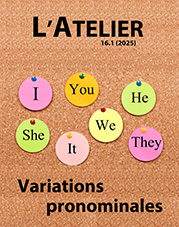Vous et nous : qui sont-ils ? Variation pronominale, différentiation et identité chez Toni Morrison
Abstract
In an absolute refusal to give in to the injunction of the “white gaze”, Toni Morrison problematizes in her discourse on her own writing the tension between a third and a first person, singular or plural. The article will attempt to show how the pronoun “you”, the second-person marker, enables the author to play with and thwart this tension without evading it or reducing it to a binary confrontation, particularly in Jazz (1992), Love (2003), Home (2012), and A Mercy (2008), where a recurring second-person address is deployed within narrative passages. Through a stylistic analysis of these four novels, based on the theory of predicative and enunciative operations, the article sets out to show how these “you”, in their variety, work on the notion of differentiation in close connection with identity, and place co-enunciation at the heart of the reading experience. Keywords: pronouns, Toni Morrison, address, co-enunciationDownloads
Published
2025-04-17
Issue
Section
ARTICLES
License
- Work submitted for publication must be original, previously unpublished, and not under consideration for publication elsewhere. If previously published figures, tables, or parts of text are to be included, the copyright-holder's permission must have been obtained prior to submission.
- Authors of accepted manuscripts will assign to L'Atelier the right to electronically distribute their article, or publish it in any form (Internet, CD ROM, printed copy) but authors will retain copyright and, after the article has appeared in L'Atelier, authors may republish their text (in print and/or electronic form) as long as they clearly acknowledge L'Atelier as the original publisher.


